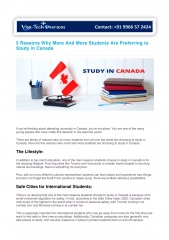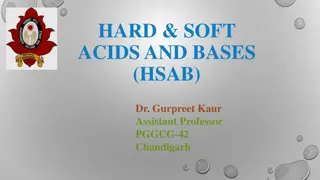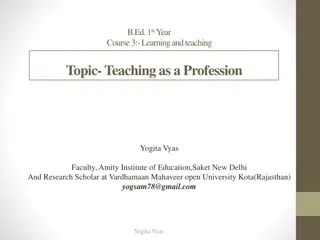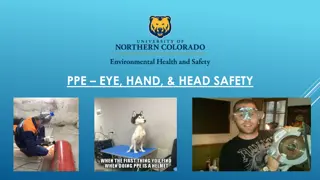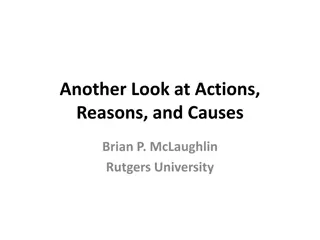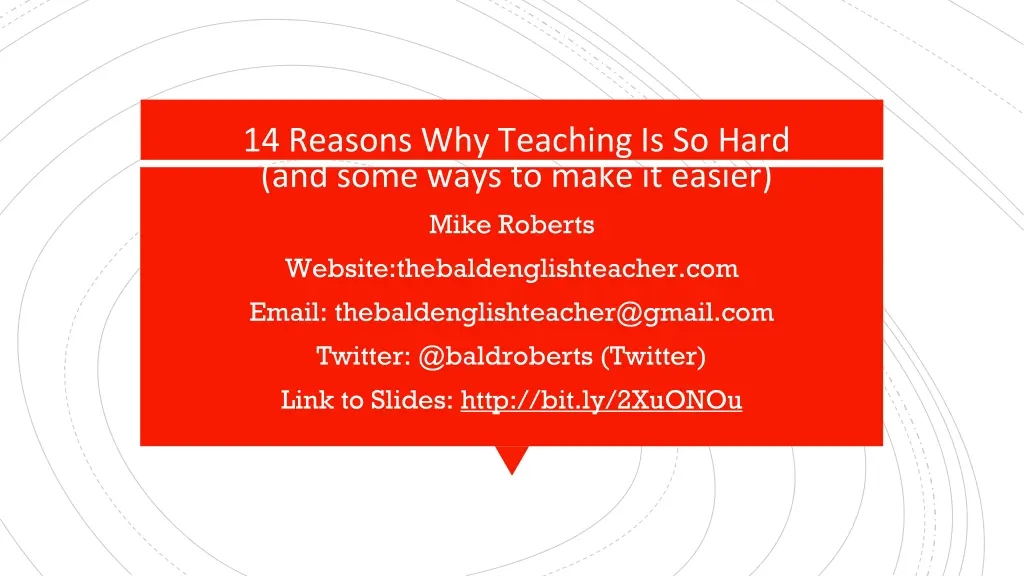
Teaching Challenges & Strategies
Discover reasons why teaching can be challenging and tactics to ease the struggle. Explore the commitment required, stress management techniques, essential tools for success, and ways to push boundaries. Enhance your teaching skills with practical advice from Mike Roberts to overcome common obstacles in education.
Download Presentation

Please find below an Image/Link to download the presentation.
The content on the website is provided AS IS for your information and personal use only. It may not be sold, licensed, or shared on other websites without obtaining consent from the author. If you encounter any issues during the download, it is possible that the publisher has removed the file from their server.
You are allowed to download the files provided on this website for personal or commercial use, subject to the condition that they are used lawfully. All files are the property of their respective owners.
The content on the website is provided AS IS for your information and personal use only. It may not be sold, licensed, or shared on other websites without obtaining consent from the author.
E N D
Presentation Transcript
14 Reasons Why Teaching Is So Hard (and some ways to make it easier) Mike Roberts Website:thebaldenglishteacher.com Email: thebaldenglishteacher@gmail.com Twitter: @baldroberts (Twitter) Link to Slides: http://bit.ly/2XuONOu
Teaching is hard because It Requires Commitment
Commit to being a better teacher by Write down one thing at the beginning of each day that you will do that will make you a better today than you were yesterday. Observe another teacher in action, and see what you can learn from them. Identify one long-term goal you have for your teaching, and label the steps that will help get you there.
Teaching is hard because It s Always a Bit Stressful
USE A PLANNER OR CALENDAR TO HELP YOU KEEP TRACK OF ALL UPCOMING MEETINGS, DUE DATES, AND EVENTS. HAVE A WELL-PLANNED LESSON PREPARED FOR EACH LESSON WITHIN YOUR CURRENT UNIT. Reduce your stress by TRY TO GET OUT OF YOUR BUILDING FOR 15 MINUTES PER DAY.
Teaching is hard because The Right Tools are Essential for Success
Add tools to your toolbelt by Offer up Create Recognize Offer up one piece of praise every five minutes. And don t always pick the same three kids! Create a unit that is completely based on student-interest. This is super-scary the first time you do it. Positively recognize three students a day for non-academic reasons. It s even better if you do this outside of your classroom.
Teaching is hard because You Have to Push Your Boundaries
Look up alternatives to traditional desks and rows, and poll your students to see if they have any interest in trying flexible seating arrangements. Add a new text (book, song, video clip, movie, etc.) to a unit you teach based on student interest and input, and monitor whether their engagement level increases as a result. Allow students to do a self- assessment on an upcoming assignment. Make sure that you give them a place to explain their reasoning for the grade. Determine whether this change in process also changes the feel of the classroom and the effectiveness of the project. Push Your Boundaries by
Teaching is hard because Opportunities to Learn are Everywhere
Enhance Your Learning by 1 2 3 Join Twitter and follow some of your favorite educators. Once you become comfortable with the platform, participate in a Twitter chat with other educators based on your content area, grade level, or personal interests. Go observe a colleague teach. Once finished, try to share what you saw with them. Re-watch your favorite teaching movie and implement one strategy the teacher uses in the film.
Teaching is hard because If It Was Easy, Everyone Would Do It!
Identify one way that you sacrifice for your students, and reflect on the positive ways this has paid off. Think of an example when you put in extra time with a student. How did this additional effort on your part improve the student s skills, and how did it make you a better educator? Embrace the challenge by Write a thank-you note to someone within your school community who gives of themselves in order to enhance the experiences of others.
Teaching is hard because You Learn a Variety of Useless Skills
Respect Listen Expand Respect that students need to go to the bathroom! Let them use it until they abuse it! Try using your keen hearing to seek out positive com- ments that students say to one another. When you hear some, let those students know that you appreciate their upbeat attitudes. Expand your facial cues to your students to include positive responses such as smiling. Remember, positive, non- verbal signs can be just as effective as the negative ones. Use These Skills for Good by
Teaching is hard because Inspiration is Needed!
Watch an inspirational YouTube video. As a starting point, try Sir Ken Robinson s TED Talk, Do Schools Kill Creativity? Search Out Inspiration by Talk with/email/text someone within your professional learning network that you admire, and thank the person for motivating you to become a better teacher. At the end of each day, reflect on one piece of greatness that you witnessed. If it was from colleagues or students, send them (or the student s parents) an email letting them know that you appreciate what they did.
Teaching is hard because It s Expensive!
Check in with your administration to see if you have a classroom budget. If so, use your skills to create a list and prioritize where that money needs to be spent, to minimize the amount of money you spend yourself. Save a little extra money Research crowdfunding sites like donorschoose.org or your school s parent/teacher association and see if they can help offset some of your classroom expenses. by Talk with other teachers within your school and see if you can pool your resources. The items you need may be available just down the hall.
Teaching is hard because Life Balance is Hard to Keep
Find balance by 1 2 3 Set a bedtime for yourself that allows you to get eight hours of sleep. Stick to it for a week, and monitor how you respond both in and out of the classroom. Establish two nights per week when you don t grade work at home. Track how this impacts your attitude within class on the following day. Go for a walk/run/hike each day after school. Use this time to transition from school life to home life.
Teaching is hard because It s Easy to Compare Yourself to Others
Creating lessons that play into your strengths. Write down three of your personality traits, and identify how they help make you an effective teacher. Avoid Comparisons By Share stories from your life with your students. They want the authentic version of you more than an imitation of someone else.
Teaching is hard because You Need to be Ready for Anything!
Update your sub plan to make sure that its clear, easy to follow, and sets the sub up for success. Your class should run almost as smoothly without you there as it does when you are present. Create three stand-alone lessons that you can implement quickly and easily at any time. Use them as a change of pace for emergency purposes. Plan ahead by Prep your students for what to do if you are absent, including how to act and where to access assignments when you have a sub.
Teaching is hard because Some Days You Just Have to Persevere
Fight through those tough days by Create a weekly Why I Love Teaching Post-it and announce your reasoning to your students. Saying it aloud will solidify the reasoning even more. Locate as many notes from former students as you can. At the beginning of each week, set one of those notes on your desk and refer to it as needed throughout the week. Build a Teacher Jams playlist with five of your all-time favorite songs. Label it Songs That Make Me Happy and start each day by playing it. You could even use this as the entrance music as students walk into your class.
Teaching is hard because People Won t Understand Why You Do It
Uncover your why by 1 2 3 Talk to colleagues about why they became teachers. Follow up by asking them about the funniest thing anyone has ever said to them about their career choice. Write down your proudest moment as a teacher and how it made you feel. Follow this up by considering other ways you could recreate this experience and feeling. Identify three teachers you admired growing up, and think about why you looked up to them. If possible, try to contact them and thank them for making such a positive impact on your life.
Contact Information Mike Roberts Website:thebaldenglishteacher.com Email: thebaldenglishteacher@gmail.com Twitter: @baldroberts (Twitter) Link to Slides: http://bit.ly/2XuONOu



